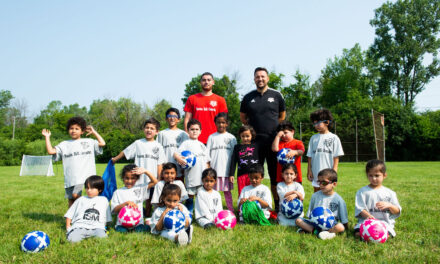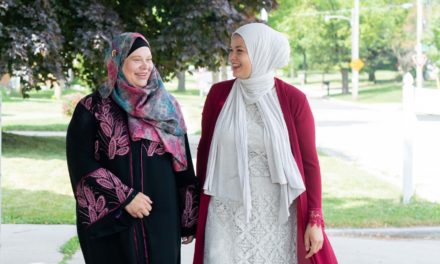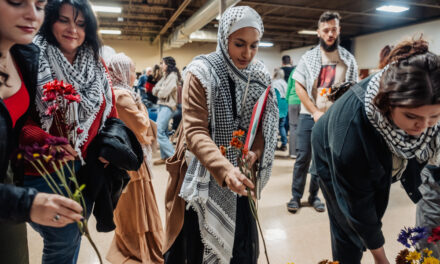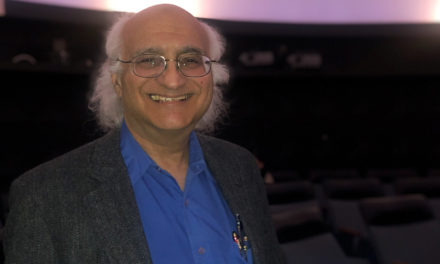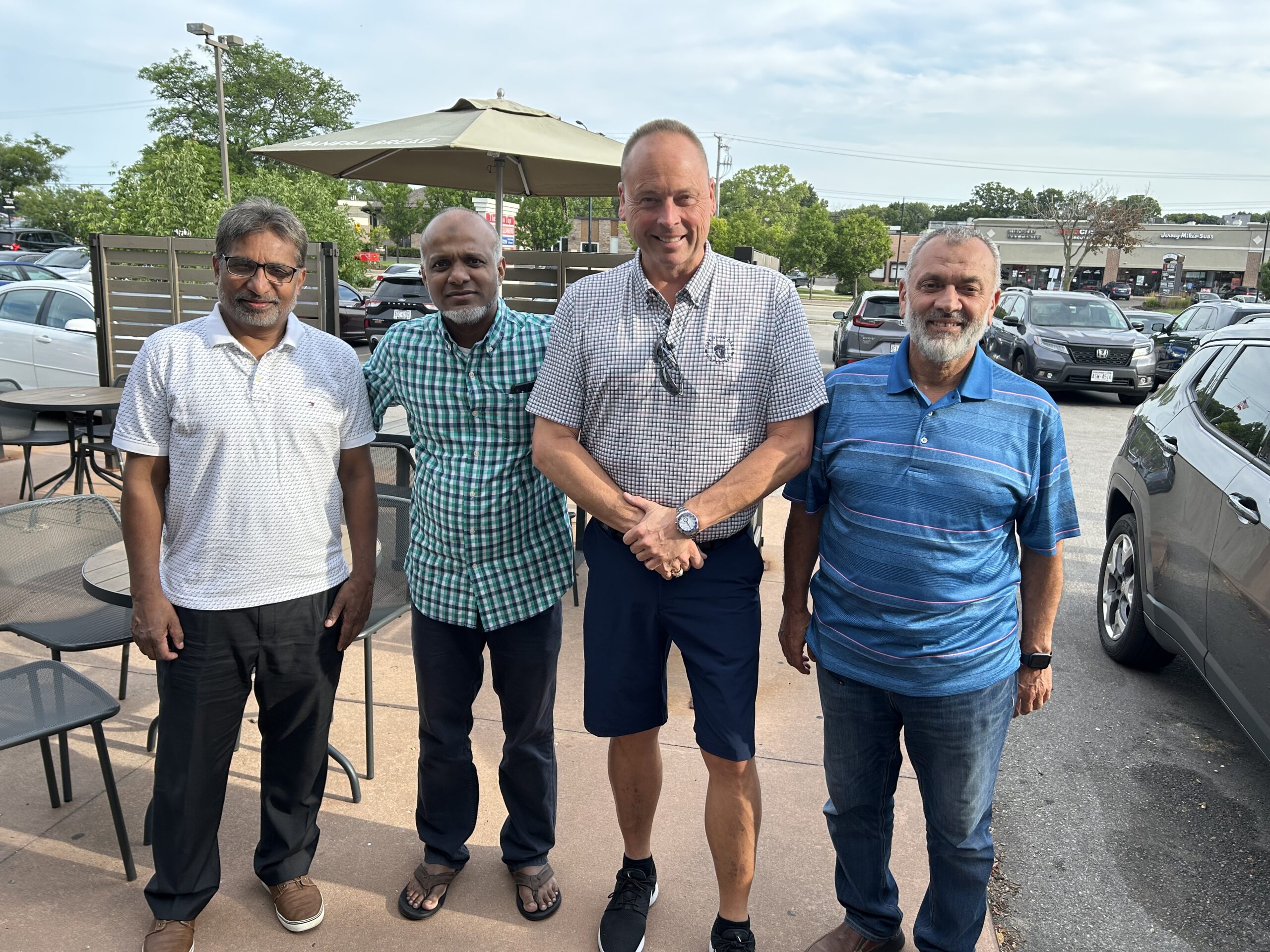
(Left-right) Franklin Finance Committee member Mohammad Nowman, school board member of Franklin Public Schools Maqsood Khan, M.D., Mayor John Nelson and Alderman Yousef Hasan met with Wisconsin Muslim Journal to discuss Muslim civic engagement.
“As Muslim Americans, we need to take advantage of the liberty and freedom we have in this country and be participants in a positive manner,” said Maqsood Khan, M.D., the first Muslim in an elected position in Franklin. Khan has served on the board of Franklin Public Schools since 2021. “It’s not enough to see the issues and complain. We need to take initiative.”
When Khan thought about what he could contribute in Franklin, he said to himself, “I’m an educator with a medical background raised by a teacher. The school board is a good avenue where I can share my knowledge.” (Khan is an adjunct assistant professor for Des Moines School of Osteopathic Medicine in Iowa. He supervises third and fourth-year medical students during rotations and is a gastroenterologist at Aurora West Allis Medical Center. His mother was a school teacher in India.) Khan ran for the school board seat in early 2021, during the COVID-19 pandemic.
In an interview at their home with his wife Arshi Wasiuddin and their five children, he explained that “Islam teaches us to be engaged in our community. We have to be active and spread the hands of friendship. The ruling in Islam is that you must know the families in your neighborhood in 40 homes in each direction, people of any religion or color. If they have any needs, we’re supposed to help. And we should find people who have common goals and work together to achieve them.”
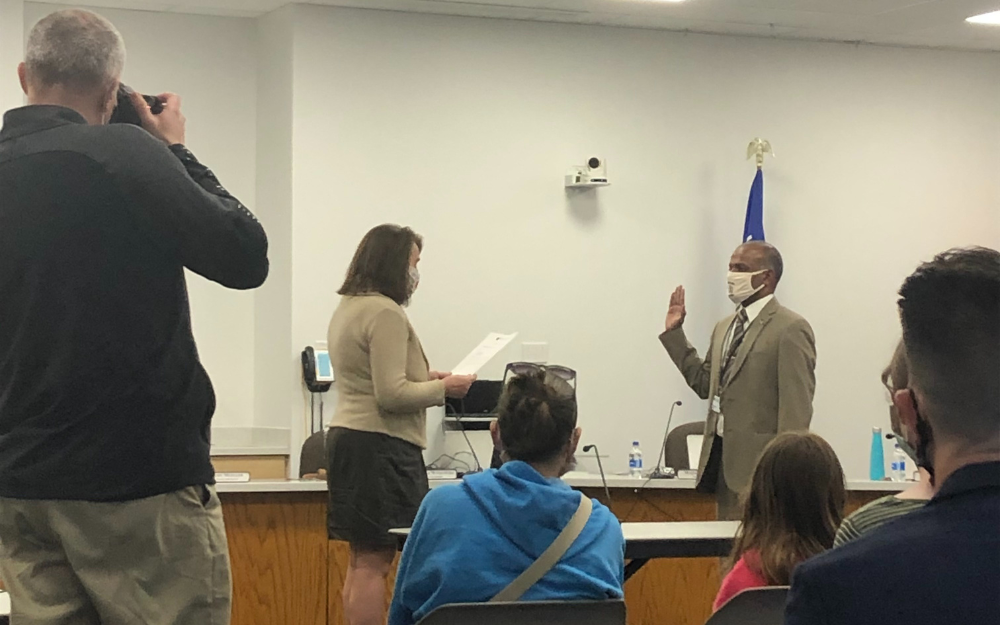
Maqsood Khan, M.D., the first Muslim to win an elected position in Franklin, joined the board of Franklin Public Schools in 2021.
Khan is a member of a growing number of Franklin Muslims who are working to improve the greater community—some in official positions and others through volunteering in schools or collaborating with friends and neighbors. In April, Yousef Hasan, a retired pharmacist, became the first Muslim to serve on the Common Council. Mohammad Nowman serves on the City of Franklin’s Finance Committee.
Arshi Wasiuddin joined other Muslim mothers of school children to host a breakfast for Franklin High School teachers and staff during Ramadan. And a contingent of Franklin Muslims marched in the city’s Fourth of July parade this year, carrying a banner that said, “Franklin’s Muslim Community.”
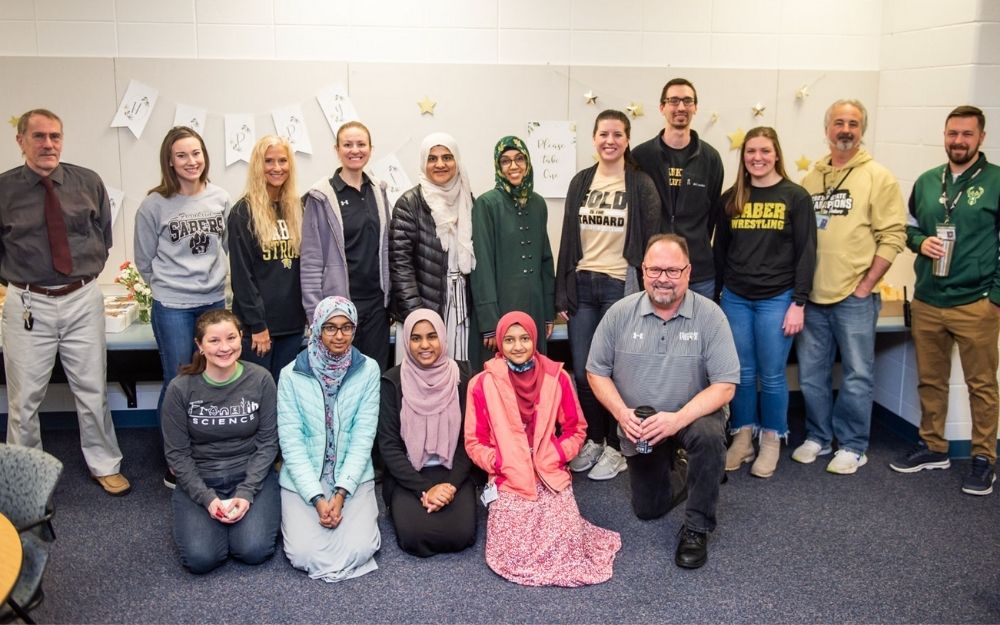
Photo by Mouna Rashid
Arshi Wasiuddin (center in green) organized a breakfast for Franklin High School teachers and staff during Ramadan.
Muslims have participated in Franklin’s Fourth of July parade as individuals in different groups in the past, Khan noted. This year they decided to be more prominent as Muslims. “Muslims have been in Franklin for more than 50 years but we never had representation on the school board or in the Common Council. We never participated as a Muslim group in civic celebrations. We want to do what we can to contribute and show we are part of this community. When I got elected, a few people came to me and said, ‘I’m so happy to see Muslims are getting engaged.’”
“We are very fortunate this group came to our city and have made it their own,” said Franklin Mayor John Nelson in a recent interview with Wisconsin Muslim Journal about the growing Muslim community in Franklin.
Who are Franklin’s Muslims?
Palestinian Americans were the first Muslims in Franklin. They moved to the area more than 50 years ago, when Franklin was a small farming community. Today Franklin’s population is over 36,000, according to the U.S. Census. Based on the total number of registered voters with Muslim names, Khan estimates there are about 1,300 Muslims living in Franklin today.
In recent years, Franklin’s Muslim community has grown more diverse. In addition to Palestinian Americans, the city has attracted African American Muslims and Muslims originally from India, Pakistan, Syria, Egypt and other countries from North Africa and the Middle East.
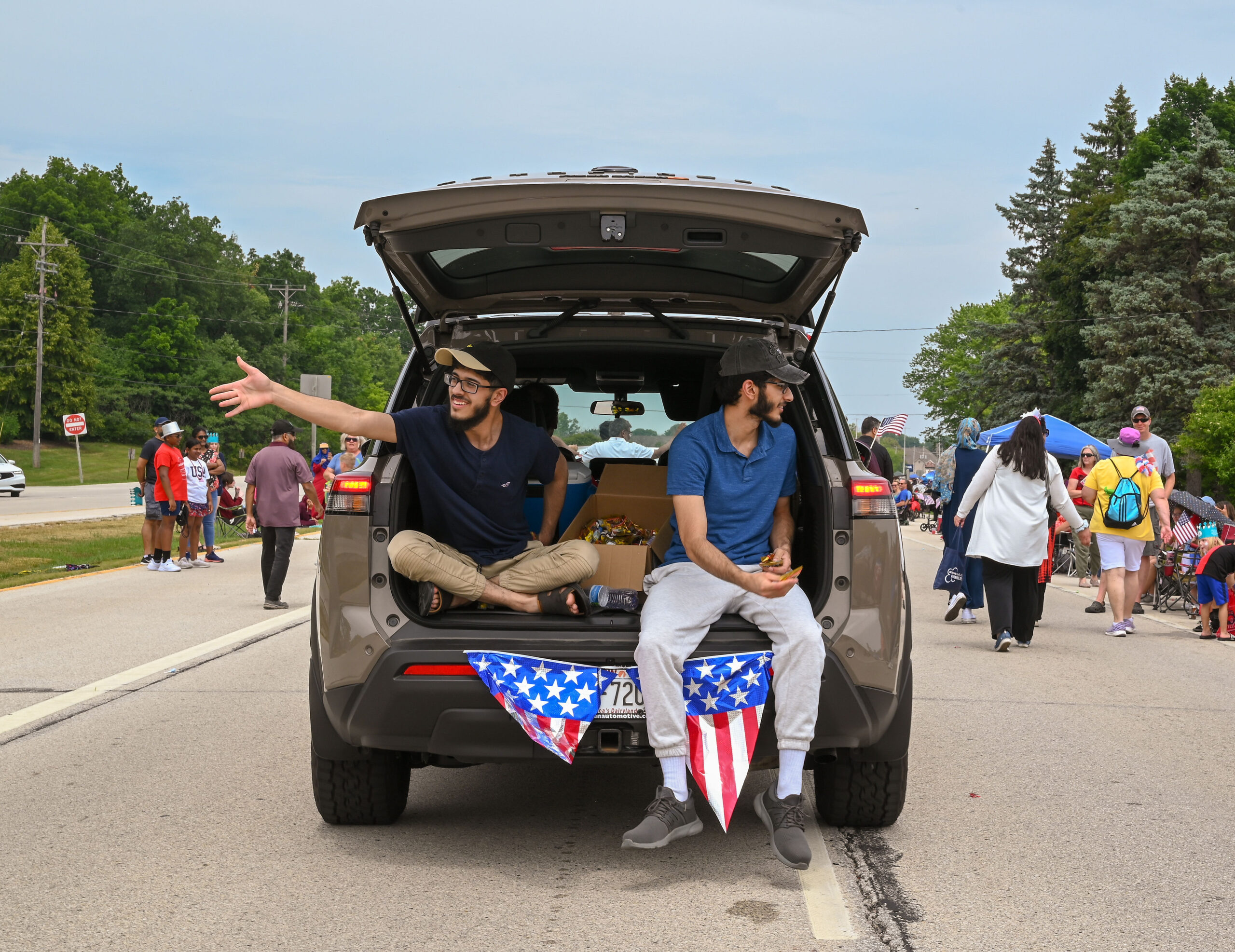
Photo by Latifa Ali
Muslim community leaders contacted fellow Muslims in Franklin to invite them to march together this year for the first time as a group in the Fourth of July parade.
Because there is no subsidized housing in Franklin, refugees and others with limited income are not likely to move to Franklin. The median price for a single-family house is $420,000, according to one source, or $480,000, according to another.
“You have to be making a certain income to buy a home here,” Khan noted. “Most people who do are professionals, accomplished in their profession.”
Muslims are well integrated in Franklin, with Muslim families scattered throughout neighborhoods. Wasiuddin has noticed, “If you find a Muslim family on any street, there’s likely another nearby. We have small clusters rather than Muslim neighborhoods.” Because the Muslim community is growing fast, it’s easy to find other Muslim families, she said, “even in the newer homes that are being built.
“Muslims like moving to Franklin because of the diverse community we have. When you go to the park, grocery store or the local bank, you always see other Muslims. And it’s so nice to say ‘Salam.’”
And we are winning over our non-Muslim neighbors, she added. “My next-door neighbor is not from the Muslim faith. She said when we first moved in, she had her guard up but when she got to know us and the values we have, she knew she could trust us. We are not like the Muslims sometimes portrayed on Fox News.”
Ali Yarkhan, a pharmacist, moved to Franklin with his wife and two children 21 years ago. They chose Franklin because of its proximity to Chicago, where his family lives, Franklin’s growing Muslim community and the schools, which have an excellent reputation, he said. And there are two mosques nearby—Al Huda and the Islamic Society of Milwaukee, as well as the Milwaukee Muslim Women’s Coalition’s Islamic Resource Center and other Muslim organizations.
“Milwaukee is close by, so you have the city, while you enjoy the luxury of living in the suburbs and don’t have to deal with congestion every day,” Yarkhan added.
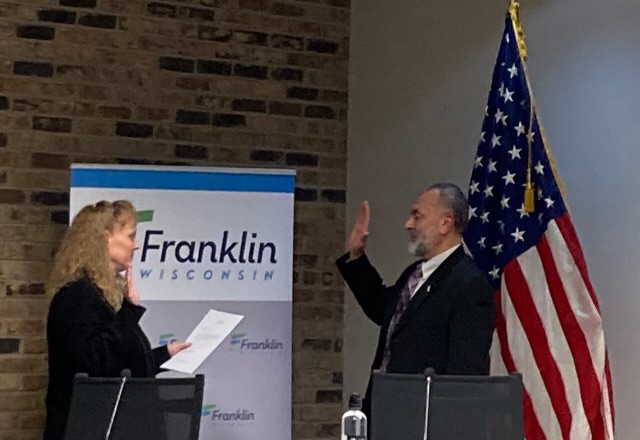
Yousef Hasan (right), the first Muslim to serve on Franklin’s Common Council, was sworn into a three-year term in April.
He also has an autistic son and some teachers in Franklin have been recognized for their work with autistic children. “I’m so glad we made the move to Franklin. We’re in a quiet neighborhood, a nice place for a family to live. The schools are good and the people are friendly. It worked out very well for us.”
Yarkhan recalled a day soon after he moved when he was out on his front lawn, trying to figure out how to assemble the lawnmower. He had lived in New York and had not needed a mower before. “My neighbor Jim saw me having difficulty and came over. We worked it out together.”
What emerges from interviews with Muslims in Franklin mirrors the first nationwide random sample survey of Muslim Americans, conducted by the Pew Research Center in 2007: the great success of the Muslim Americans in socioeconomic assimilation and integration. The survey noted “they’re decidedly American in outlook. Seventy-two percent of them take the very American point of view that with hard work you can get ahead and succeed in this society. That’s an even larger percentage than the general public.
“This is a group that is living as most Americans are – we find Muslim Americans to be highly assimilated … Most do not see a conflict between being a devout Muslim and living in a modern society.”
Muslim values push them to strive to make the community better through civic activity, volunteering and community work. They are also driven by the desire to change negative views about Muslims, which they still encounter,” Maqsood Khan said.
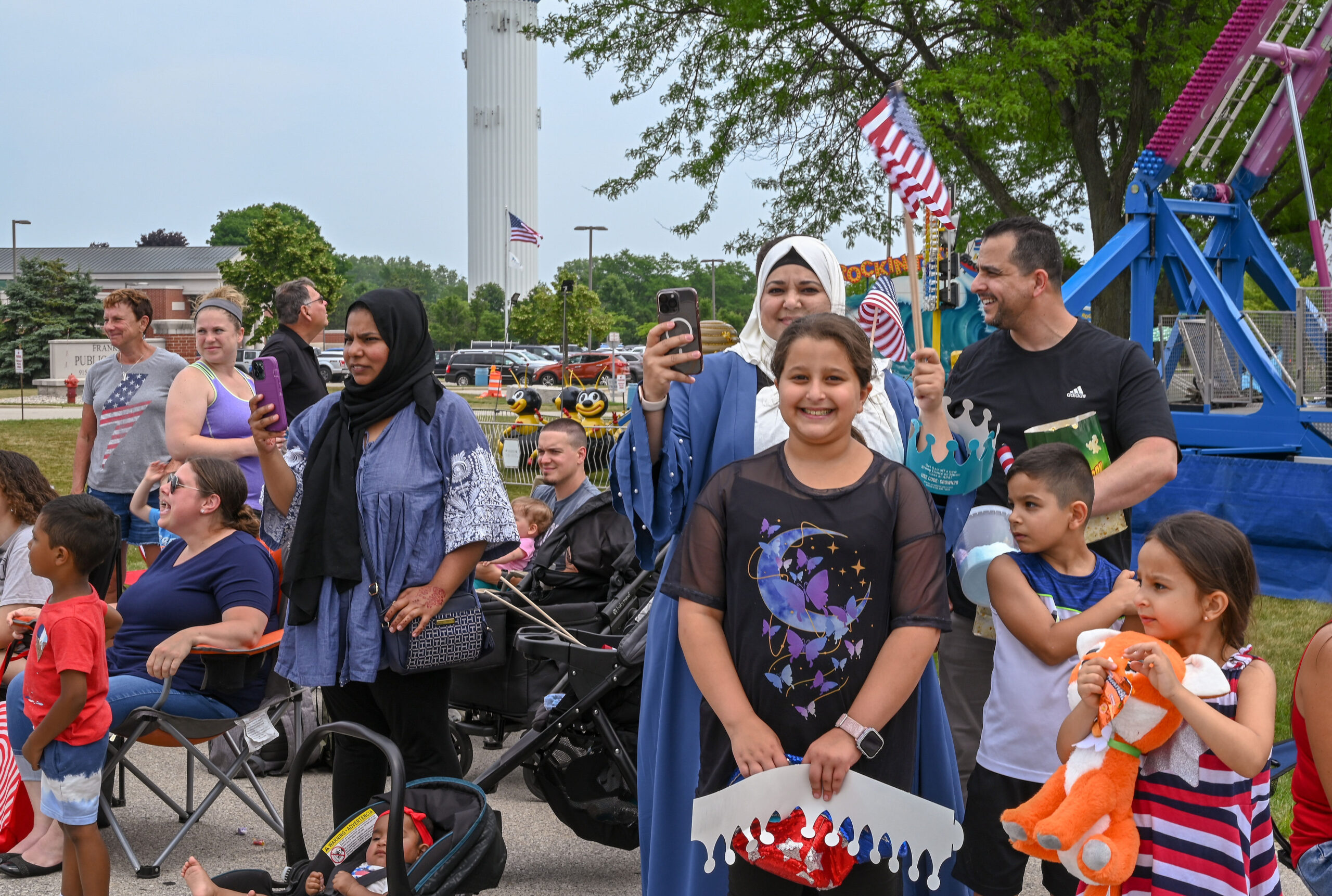
Photo by Latifa Ali
Recent Pew Research Center reports confirm that many Americans still have negative views towards Muslims and Islam (53%) and at the same time don’t know anyone who is Muslim or much about Islam (52%). Americans who are not Muslim and who personally know someone who is Muslim are more likely to have a positive view of Muslims, and they are less likely to believe that Islam encourages violence more than other religions.
That’s another reason Khan ran for his post on the school board, encouraging other Muslims to pursue civic roles and rallied Muslims to participate as a community in the Franklin Fourth of July parade, he said. “Let’s participate, show our patriotism and let people know who we are,” he said.
Building a future
At a meeting with WMJ at Panera, Mayor Nelson, Alderman Hasan, School Board Representative Khan and Finance Committee member Mohammad Nowman met to talk about Muslims role in helping shape Franklin’s future.
“If we were not in these positions, then there is no one voicing our concerns, interests at the table,” Nowman noted. Nowman has been in Franklin since 1998. He worked as an IT specialist for Johnson Controls and wanted a home close to the ISM, “and at the same time, a neighborhood that is safe for our kids and not too far away from downtown.”
Franklin’s Muslims encourage each other to vote, run for office and follow local issues by communicating in WhatsApp groups, text messaging, email and other channels, Yarkhan explained via Zoom. “It helps a lot, especially at the time of elections, because there is a constant need for information—where and when to vote, how to vote early.
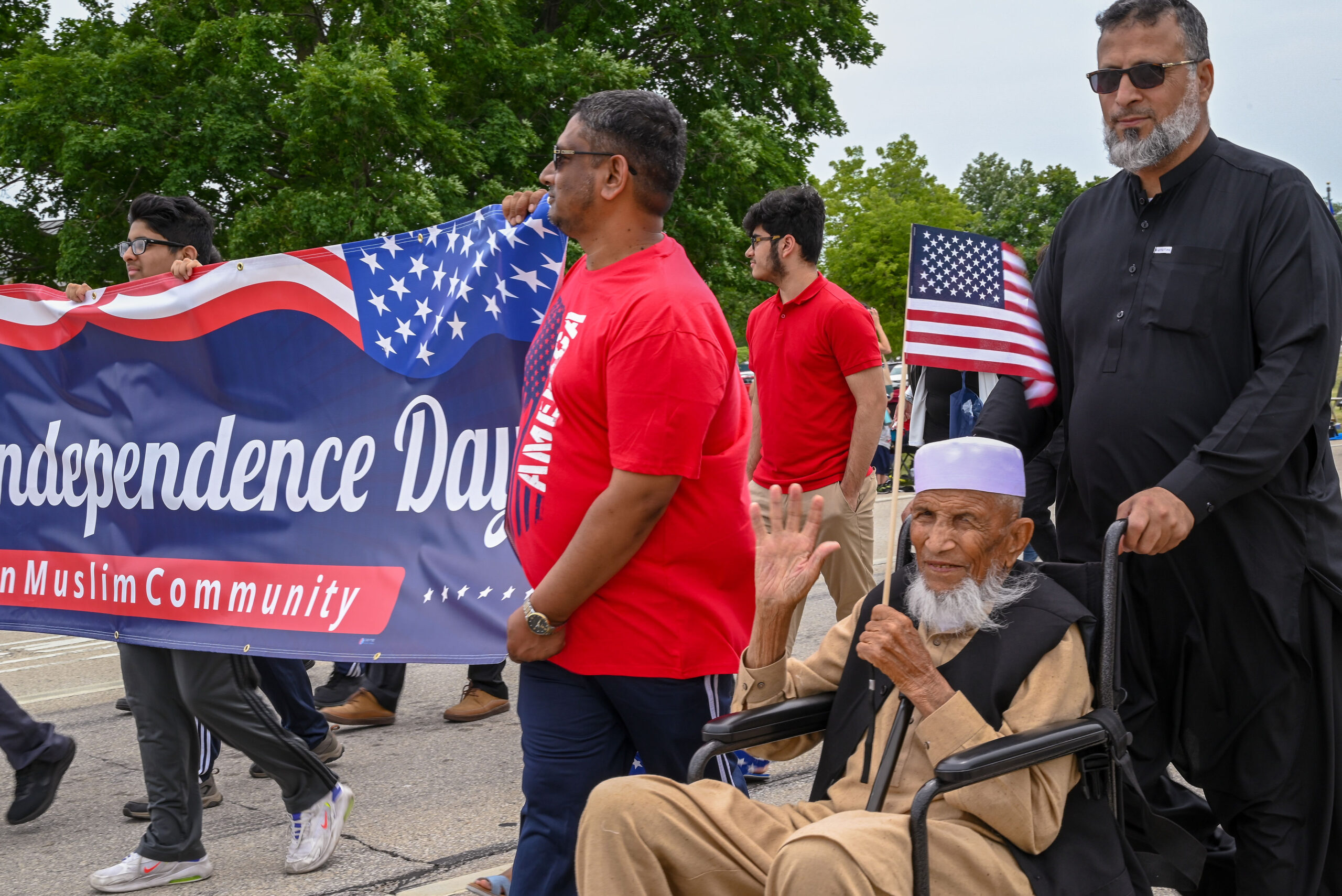
Photo by Latifa Ali
“We did not know the value of the Ward (voting district) before. Many Muslims used to vote only in big elections, like presidential elections. Now we are making sure they vote in all elections. That’s our strength. We are also attending city council meetings and town hall meetings to let our issues be heard and get answers.”
Since Franklin’s Muslims have stepped up and are speaking out, they have the opportunity to influence land-use decisions, community development and service delivery in the community, Mayor Nelson said. And that’s good for Franklin.
“Look at Yousef (Alderman Hasan). He comes to us as a recently retired pharmacist. It is unheard of to have that level of professional background, bringing that type of skill set. And only recently retiring, he is so current with what’s going on and achieved so much in his career. That’s the type of person, in my opinion, we want leading our city.
“We want a bunch of smart people to talk about options and recognize pitfalls, to help navigate us to what is in the best interest of the city.”
Public service is a big commitment that is not well compensated in Franklin, he added. The City Council meets the first and third Tuesday of the month for between three and five hours each time. In between, Hasan and others on the council attend the boards and commissions as assigned. The city has a $26 million budget and “a lot going on” that requires attention.
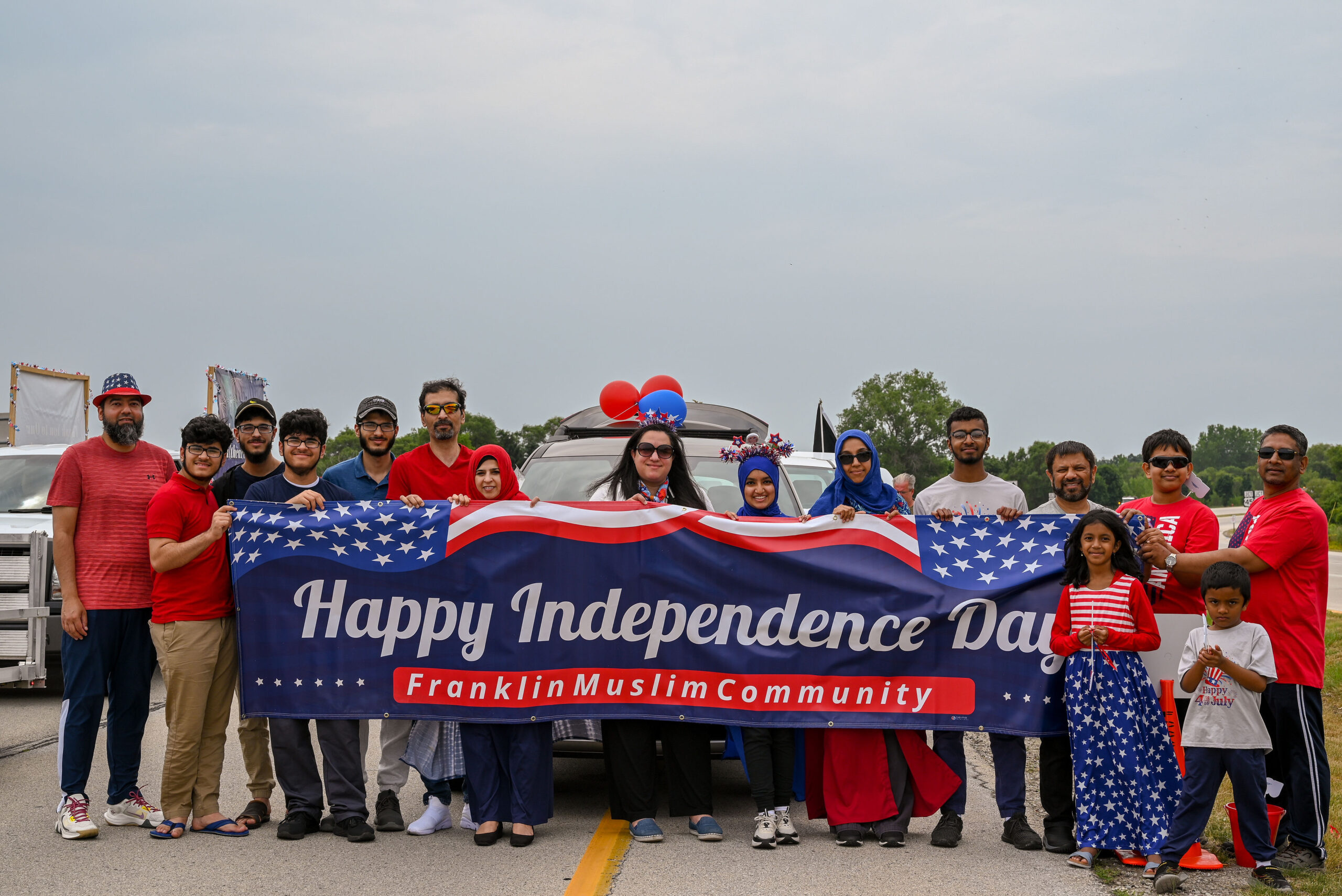
Photo by Latifa Ali
Nelson reflected on the growing role of Muslims in Franklin. “I was born and raised in Franklin. I’ve lived here my entire life. Going back to my grade school, middle school and high school, there were no Muslim kids,” he said. “I started noticing the Muslim community growing in the late 1990s. I didn’t know of any Muslim families personally until I started working on the city’s boards and commissions about 15 years ago.
“It’s very humbling and I’m appreciative that this is a very professional community coming in here. Doctors, pharmacists, lawyers, professionals–we’re getting very accomplished citizens, which only makes our community shine.
“They chose Franklin to build and raise a family and work. And that’s amazing.”
The Muslim community leaders interviewed for this story say their children are likely to settle in Franklin when they are grown. Some of them already are.
Noman’s eldest son, a dentist, had an offer on a house in his parents’ subdivision at the time of the interview.
Two of Hasan’s children own property in Franklin—“my daughter and her family and my son and his family,” he said.
“That’s fantastic,” Nelson exclaimed. “The second generation is staying in Franklin. That’s a huge statement. I think they are feeling welcomed and have enjoyed growing up here.”
